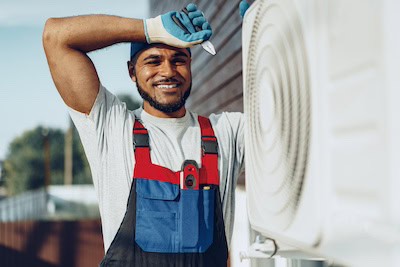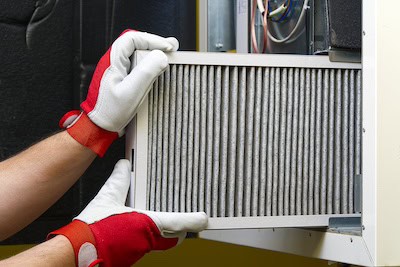Your Comfort, Our Priority
With expert technicians and a commitment to quality, Wolf delivers reliable heating and cooling solutions for every season. Experience the difference of service you can trust.
(918) 633-9077Heating, Ventilation, and Air Conditioning (HVAC) systems are crucial in maintaining indoor comfort and air quality. These systems regulate temperature, humidity, and airflow within buildings, ensuring a comfortable and healthy living environment. However, without regular maintenance, HVAC systems can harbor dust, mold, and other pollutants that compromise air quality.
HVAC maintenance refers to the routine inspection, cleaning, and servicing of heating and cooling systems. It ensures optimal performance, extends the life of the equipment, and most importantly, improves indoor air quality. Regular maintenance can prevent the buildup of harmful particles like dust and allergens, promoting a healthier home environment.

Your HVAC system is constantly circulating air throughout your home or office. If the system is not well-maintained, it can circulate dust, pet dander, and other airborne contaminants. This can lead to respiratory problems, allergies, and long-term health risks. Maintaining your HVAC system ensures that it functions efficiently, reducing the spread of pollutants.
Poor indoor air quality can lead to a variety of health issues, including asthma, allergies, and respiratory infections. Long-term exposure to harmful air pollutants can even cause more severe conditions, such as chronic lung diseases. Regular HVAC maintenance helps to filter out harmful particles and maintain a clean and healthy environment.
Air filters are the first line of defense in maintaining indoor air quality. Over time, these filters become clogged with dust and debris, reducing their effectiveness. Replacing air filters regularly is essential to ensure that your HVAC system can properly filter out pollutants. Clean filters also improve the efficiency of the system, leading to energy savings.
The ductwork in your HVAC system can accumulate dust, dirt, and mold over time. This buildup can restrict airflow and reduce the efficiency of your HVAC system. More importantly, it can release harmful pollutants into the air you breathe. Regular duct cleaning ensures that your system is circulating clean, fresh air throughout your home.
An HVAC system that is not properly maintained will have to work harder to heat or cool your home, leading to higher energy bills. Additionally, a poorly maintained system can release more pollutants into the air, reducing overall air quality. Regular maintenance improves the energy efficiency of your HVAC system, leading to better air quality and lower energy costs.
Mold, dust, and allergens are common airborne pollutants that can accumulate in your HVAC system. Regular inspections allow HVAC technicians to identify and address these issues before they affect your indoor air quality. By scheduling routine inspections, you can ensure that your system is functioning properly and that your air is free from harmful contaminants.
To keep your HVAC system running smoothly and maintain optimal air quality, it’s important to perform seasonal maintenance. In the spring and fall, when HVAC systems are under less strain, you should schedule professional maintenance to clean filters, ducts, and other components. This will help to prevent any air quality issues during the hotter and colder months.
While some aspects of HVAC maintenance, such as changing air filters, can be done by homeowners, other tasks are best left to professionals. A qualified HVAC technician has the tools and knowledge to perform thorough inspections, clean ducts, and ensure that your system is running efficiently. Knowing when to call a professional is key to maintaining good air quality.
By investing in regular HVAC maintenance, you can save money in the long run. A well-maintained system will last longer, require fewer repairs, and operate more efficiently, reducing energy costs. Additionally, maintaining good air quality can reduce medical expenses related to respiratory problems and allergies.
A well-maintained HVAC system not only improves air quality but also has environmental benefits. Efficient systems use less energy, reducing the carbon footprint of your home or business. By keeping your HVAC system in good condition, you’re doing your part to protect the environment.
Smart thermostats can optimize your HVAC system’s performance by learning your habits and adjusting the temperature accordingly. These devices can also monitor air quality and alert you when maintenance is needed, ensuring that your system is always running at peak efficiency.
For optimal performance and air quality, HVAC systems should be serviced at least twice a year. Homeowners should schedule maintenance in the spring and fall, while businesses may need more frequent inspections depending on their size and usage.

Regular HVAC maintenance is essential for maintaining good air quality, improving energy efficiency, and ensuring the longevity of your system. By investing in routine inspections and cleaning, you can protect your health, save money, and reduce your environmental impact. Additionally, by performing regular HVAC maintenance you’ll also be able to breathe easier and reduce the cost of your energy bill because a more efficient system will cost less to run.
How often to do HVAC maintenance is best when it’s done twice a year, in the spring and the fall. However, some choose to only do their routine HVAC maintenance once a year.
Regular maintenance removes dust, mold, and allergens from your system, ensuring cleaner air circulation. It also increases your system’s ability to improve the air quality and remove the accumulation of those particles from your indoor air. Additionally, by replacing worn-out components, and cleaning the ducts, it also helps the system to work efficiently and to keep the indoor air quality at its best.
Air filters should be replaced every 1-3 months. This can depend on a variety of things. What type of climate your home is located in can have an effect, as well as the age of your home, the age of your system, and if you have any pets also. So be sure to check with your HVAC company on what’s best for your home.
Basic tasks like replacing filters can be done by homeowners, but professional services are recommended for duct cleaning and inspections.
There are a variety of symptoms that can indicate that you have poor indoor air quality. You’ll want to be on the lookout for unpleasant odors, mold, cough, dust, humidity issues, asthma or other breathing issues, and dust. If you suspect you have poor indoor air quality you’ll want to contact your local HVAC company.
Yes, ducts can harbor dust, mold, and other pollutants that reduce air quality and system efficiency. This is even more common to see in older homes that have an older HVAC system.
There are many benefits to smart thermostats, many of which can help with your indoor air quality. Smart thermostats can monitor air quality, alert you when maintenance is needed, and optimize your system’s performance.
Avoiding HVAC maintenance can be put off for a short time if needed, but it’s not recommended in the long term. Not having your HVAC maintenance performed can increase your energy bill due to decreased efficiency, poor indoor air quality, equipment breakdowns, and more.
With expert technicians and a commitment to quality, Wolf delivers reliable heating and cooling solutions for every season. Experience the difference of service you can trust.
(918) 633-9077
Bryan was professional and very knowledgeable. He did his best to fix my 30 yr old unit b4 making the decision to replace it. Then he charged me a yearly maintenance fee for the day since we purchased a new A/C. On top of everything, Bryan came back at 10 pm to bring window units to make sure my home would be cool. Thank you Read More

Had a new system installed, and they did an outstanding job. Arrived in the time frame that they said they would and started removing the old system. It took about 9 hours, but they moved the outside unit like I had asked with no hesitation. Ran new copper tubing, drain line, and electric. Did a very clean job on the installation, as you can see Read More

Great company with awesome employees. A friend of mine recommended Wolf’s when my ancient AC went out. Staff are always punctual, respectful and knowledgeable. No one wants to buy a new heat and air system, but this company made the process as easy and painless as possible!

Dalton Yandell was very thorough on servicing our unit. Not only did he clean around the outside of the unit, he also evaluated the condition of the inside of the unit and also clean it very thoroughly. He left an application to obtain a rewards membership to service our unit twice a year. Was very impressed with his work ethic, he was very cordial and Read More

Highly recommend Wolf’s Heating & Air Conditioning! They went above and beyond to get us on their schedule. Sam and Marcus did a fantastic job figuring out the issue, ordering the parts and making sure we were up and running! They were polite, professional and thorough!
Our experienced technicians handle the hard work so you don’t have to. Whether it’s maintenance, repairs, or installation, Wolf Heating & Air is ready to help.
(918) 633-9077